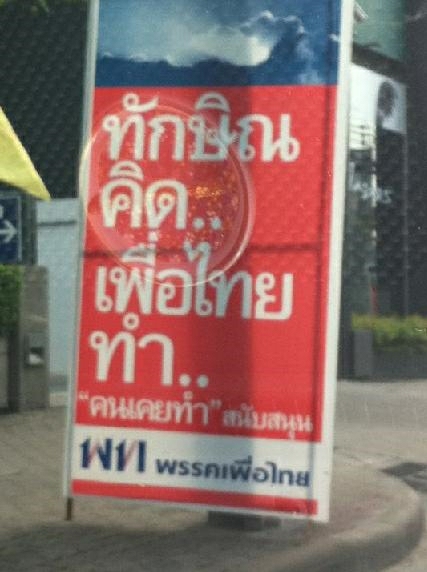The campaign posters for the Puea Thai party couldn’t have been clearer: “Thaksin thinks, Puea Thai acts”. No other political party campaigning for the upcoming election has a more straightforward platform.
Re-branding Puea Thai would be a foolish thing to do. Having listened to Thaksin’s video link in March where at least 50,000 Red Shirt supporters turned up, Thaksin remains, without doubt, the Reds’ ultimate leader. Since Thaksin was deposed in a coup, Puea Thai has significantly weakened, most notably in its leadership and party organization. Puea Thai has experienced one of its most difficult time these past few months as factions began to emerge, most notably the Mingkwan Faction and Isan Pattana Faction (associated with the former Wang Nam Yen Faction of Sanoh Tienthong). All of this led to General Chavalit’s resignation, threats of defections of at least 10 party members keen to follow the general, and some 10-20 more members from the noted factions. In addition, the position of the party’s PM candidate remains undetermined, leading to speculation about rivalries and a possible split within the party as key members vie for position. Thaksin has the last word on who gets to become the party’s premiere candidate, but even Thaksin himself has held off making the announcement until the very last minute, fearing internal power struggles and additional defections of some members from the party.
It’s clear Puea Thai is in disarray without Thaksin. Thaksin’s barami, leadership skills and deep pockets helped steer the party out of crisis at the most critical time (pre-election). Thaksin persuaded Yongyuth Wichaidi, former party chief, to reassume the leadership position despite his personal objection to leading the party. He managed to convince Mingkwan, who only answers to Thaksin and one other Puea Thai member, and Sanoh’s allies to stay. Thaksin’s ability to manage various groups and factions within the party, despite his physical absence, speaks volumes to the qualities of his leadership. Puea Thai has now selected candidates to run for roughly 95% of the seats. Thaksin is the only one capable of running Puea Thai and the only one who voters identify as Puea Thai’s leader. The party’s slogan “Thaksin thinks, Puea Thai does” makes sense.
I had once hoped that Thai Rak Thai would transform Thailand’s party system from one marked by patronage-styled politics to one of programmatic politics, whereby ideology and party platforms, not personalism, define party membership.
But we’re not there yet. Puea Thai is, after all, Thaksin Inc.
 Facebook
Facebook  Twitter
Twitter  Soundcloud
Soundcloud  Youtube
Youtube  Rss
Rss 